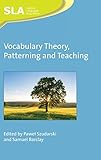Vocabulary Theory, Patterning and Teaching / ed. by Paweł Szudarski, Samuel Barclay.
Material type: TextSeries: Second Language Acquisition ; 152Publisher: Bristol ; Blue Ridge Summit : Multilingual Matters, [2021]Copyright date: ©2022Description: 1 online resource (296 p.)Content type:
TextSeries: Second Language Acquisition ; 152Publisher: Bristol ; Blue Ridge Summit : Multilingual Matters, [2021]Copyright date: ©2022Description: 1 online resource (296 p.)Content type: - 9781788923743
- 9781788923750
- P53.9
- online - DeGruyter
| Item type | Current library | Call number | URL | Status | Notes | Barcode | |
|---|---|---|---|---|---|---|---|
 eBook
eBook
|
Biblioteca "Angelicum" Pont. Univ. S.Tommaso d'Aquino Nuvola online | online - DeGruyter (Browse shelf(Opens below)) | Online access | Not for loan (Accesso limitato) | Accesso per gli utenti autorizzati / Access for authorized users | (dgr)9781788923750 |
Frontmatter -- Contents -- Contributors -- Foreword -- 1. Introduction -- Part 1: Theorising and Testing Vocabulary -- 2. Innovation in Measures of Breadth and Depth of Vocabulary Knowledge -- 3. Vocabulary Knowledge: Lexical Depth and Its Relationship with Out-of-Class Exposure -- 4. Does One Size Fit All? Comparing Two Computer-Adaptive Algorithms for a Diagnostic Vocabulary Test -- 5. The Effects of Item Exposure Control on English Vocabulary Size Estimates in Computerized-Adaptive Testing -- Part 2: Formulaic Language -- 6. Formulaic Sequences and Second Language Learning -- 7. The Development of Academic Collocations in Children’s Writing -- 8. Examining L2 Learners’ Confidence of Collocational Knowledge -- 9. Predicting Parameters of Variation in the Use of Academic Multiword Expressions in University Student Writing -- Part 3. Learning and Teaching L2 Vocabulary -- 10. Vocabulary Learning and Teaching -- 11. The Role of Visual Imagery in Semantic Clustering -- 12. The Deliberate Learning of L2-L1 Word Lists: Effectiveness and Learners’ Perceptions -- 13. A Student-Generated Vocabulary Syllabus in an English for Academic Purposes (EAP) Context -- 14. Conclusion: Looking Back and Moving Forward in Vocabulary Studies -- Afterword -- Appendix. Final Vocabulary Test -- Index
restricted access online access with authorization star
http://purl.org/coar/access_right/c_16ec
This book presents the current state of knowledge in the vibrant and diverse field of vocabulary studies, summarising the latest empirical studies and providing a firm indication of the future of the field. The chapters cover the key themes of theorizing and measuring vocabulary knowledge, formulaic language, and learning and teaching vocabulary.
Mode of access: Internet via World Wide Web.
In English.
Description based on online resource; title from PDF title page (publisher's Web site, viewed 25. Jun 2024)


